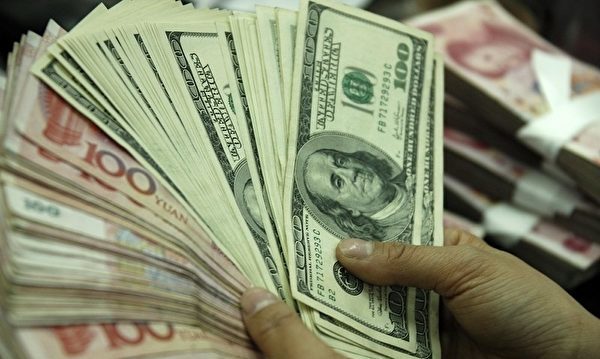[EpochTimesOctober292021]On October 28, the onshore price of RMB against the US dollar closed in heavy volume and fell to a record low in more than a week, and the central parity rate also fell by more than 100 points, setting a low in more than a week.
On the 28th, the onshore price of RMB against the US dollar closed at 6.4006 RMB to 1 US dollar, down 0.11% from 6.3934 in the previous trading day. Reuters said that the closing price hit a new low in more than a week.
On the same day, the central parity of the RMB, which represents the official attitude of the Chinese Communist Party, was reported at 6.3957, down 101 points or 0.16% from 6.3856 in the previous trading day.
Reuters quoted traders as saying that the U.S. dollar was weak in the afternoon and the demand for foreign exchange settlement from customers was strong. The yuan once reversed the early decline and rose. However, near the end of the day, major state-owned mainland banks bought U.S. dollars in the spot market, causing the exchange rate to fall back to 6.4 yuan again. Weak side. Moreover, this is the second day in a row that a major mainland bank has taken such operations in late trading hours.
Traders said that they need to focus on the mid-price pricing level tomorrow; if it is obviously weak, it may mean that the Chinese Communist Party does not want the yuan to be too strong as the Fed cuts its easing policy.
Some market participants said that it is not yet certain whether Dahang’s move represents its corporate customers who need to purchase foreign exchange. The closing price of RMB may affect the official RMB central parity the next day.
In this regard, commentator Wen Xiaogang told The Epoch Times that although mainland exports continued the momentum of the first half in the third quarter, as the plague of other countries in the world eased, mainland production capacity began to move abroad, and exports were also declining. Some people in the mainland industry believe that exports will decline in the fourth quarter, and will even drag down GDP growth. In addition, there are more economic problems in the mainland. The Chinese Communist Party does not want the people to become stronger and use big state-owned banks to interfere with the RMB exchange rate.
As of 9:08 on October 29, Beijing time, the FOB price of RMB was reported at 6.3888.
Editor in charge: Liu Yi
.
